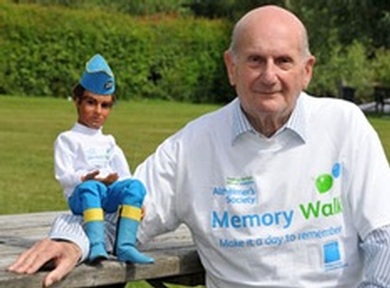Thunderbirds creator, Gerry Anderson, donated his brain to dementia research
Thunderbirds creator Gerry Anderson, who died on Boxing Day, donated his brain for medical research into Alzheimer’s disease.

Mr Anderson, who died at the age of 83, wanted to help other dementia sufferers and gave his brain to the Brains for Dementia Research project.
Anderson began his television career in the 1950s and established himself as one of Britain's leading creative brains over a career spanning nearly six decades. He made his name in the 1960s with a series of hit sci-fi puppet shows including Captain Scarlet and Joe 90.
But he is best known for Thunderbirds which followed the adventures of International Rescue, a secret organisation operating from Tracey Island.
Mr Anderson was diagnosed with the condition in 2010 and spent the last years of his life fighting to raise awareness of Alzheimer's disease.
When he officially launched the Memory Walk organised by Alzheimer's Society and Bupa Care Homes last year, he said: “I was upset when I found out I had dementia but I try to stay positive and enjoy every day. My dementia hasn't just affected me; it’s affected my friends and family too.”
Jeremy Hughes, chief executive at the called Gerry Anderson an “outstanding supporter of Alzheimer's Society and campaigner on behalf of people with dementia”.
He added: “He was determined, despite his own recent diagnosis, to spend the last year of his life speaking out for others living with dementia to ensure their voices were heard and their lives improved.”
Brains for Dementia Research is jointly funded by the Alzheimer's Research Trust and the Alzheimer's Society.
It is enabling four leading brain tissue banks (based at the Institute of Psychiatry, Oxford University, Newcastle University, Manchester University) and one tissue donation centre (Cardiff University) to recruit and clinically assess potential donors and collect and provide donated brain tissue for quality research into causes and treatments for dementia.
The project is always looking for people diagnosed with memory impairment or dementia to take part.
People over the age of 65 who do not have a memory impairment, so called 'normal controls', are also needed, as normal brain tissue is in extremely short supply. There is no upper age limit.
More information on donating brains for research can be found at http://www.brainsfordementiaresearch.org.uk
Latest News
 29-Jul-24
Dementia Bus gives carehome.co.uk staff insight into life with dementia
29-Jul-24
Dementia Bus gives carehome.co.uk staff insight into life with dementia
 01-Mar-24
Find out the top care homes in 2024
01-Mar-24
Find out the top care homes in 2024
 21-Mar-23
UK's top care homes in 2023 revealed
21-Mar-23
UK's top care homes in 2023 revealed
 03-Jan-23
carehome.co.uk launches free care helpline
03-Jan-23
carehome.co.uk launches free care helpline
 13-Dec-22
5 mins with Emily Whitehurst, chief operating officer for Constantia Healthcare
13-Dec-22
5 mins with Emily Whitehurst, chief operating officer for Constantia Healthcare